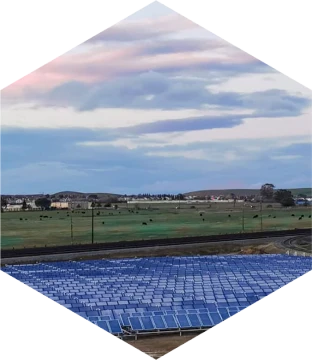The Golan Heights Winery
Founded in 1983
Headquarters: Katzrin, Israel
Employees: 110
Area: 6,300 dunams of vineyards
85℃ Hot water for wooden barrels, washing, and CIP
70% Emissions reduction
>300,000 NIS Annual savings in diesel costs
Cutting emissions by 70% while dramatically reducing fuel costs is what The Golan Heights Winery achieved by adopting solar thermal technologies.
The Golan Heights Winery, among Israel’s leading producers of quality wines, has always been at the forefront of innovation in winemaking. However, its commitment to excellence extends beyond just wine production. The management, recognizing the environmental impacts of using fossil fuels, was determined to modernize its energy usage, particularly in heating water, a critical process in the business’s daily operations.
In 2014, the management started looking to replace its expensive, polluting diesel-powered water heating burners with a new renewable heat technology.
When the process was completed, The winery exchanged most of its fossil fuel consumption with free and clean, renewable solar heat energy.
Overcoming traditional solar thermal energy technology issues
The winery’s traditional approach involved diesel burning to heat water for various processes like washing wooden wine barrels and cleaning machinery (CIP). Moving to a cleaner solar thermal technology posed significant challenges:
- Budget: Financial constraints demanded a cost-effective solution with a lucrativeROI.
High-temperature requirement: Diesel fuel is a significant pollutant. The washing and cleaning processes demand hot water at higher temperatures than most solar thermal technologies could produce. - Steady supply: As an agricultural-industrial plant, the winery’s smooth operation demanded a constant hot water supply available post-sundown and during cloudy days (a considerable challenge for solar thermal technologies). High efficiency collectors and thermal storage are a requirement.
- Cold winter: Ideal for wine grapes, the cold winters in the Golan Heights are less than ideal for conventional solar thermal collectors, as they cannot produce hot water at an adequate efficiency in such weather conditions.
The winery’s management began to search for a renewable heat technology, environmentally friendly, cost-effective solution that met the operational demands. Renewable heat energy: unleashing efficiency with innovative collectors, storage, and control.
The Golan Heights Winery chose TIGI Solar, renowned for its expertise in thermo-solar systems, for its ability to meet these unique challenges:
- Advanced thermal solar collectors: TIGI installed 120 of its Honeycomb solar thermal collectors, capable of heating water to 90℃, even during harsh winters. The proprietary Honeycomb collector uses transparent insulation on the sun-facing side; the technology dramatically reduces heat losses even in cold temperatures, making it significantly more
efficient and less area-demanding than other collectors in the market. - Thermal storage system: This system stores hot water for 24/7 use, ensuring availability even after dark with minimal temperature loss. A 30 m2 stratified tank stores hot water layers at different temperatures. The sophisticated management allows an optimal water supply in varied temperatures between heat processes. This also allows it to generate heat when the
winery is not operating, during the weekend, and use the heat on weekdays. - Smart cloud-based control: The innovative control ensures optimal dynamic source allocation and management, balancing solar energy and operational demands, allowing 24/7/365 control from desktop and mobile devices.
Sustainable, economical, and efficient winery via renewable heat technology Implementing TIGI’s solar thermal technologies at the Golan Heights Winery brought significant
advantages and benefits, fundamentally transforming its approach to energy.
One of the most striking outcomes of the project has been the substantial reduction in environmental impact. With the system in place, the winery has achieved an impressive 70% reduction in emissions of the heat process, marking a significant step forward in its sustainability efforts.
At the same time, notable financial gains complemented this environmental benefit. Annually, the winery now saves more than 300,000 NIS on fuel costs, as the dependence on diesel has been almost eliminated, with solar energy now fulfilling most of the hot water requirements. This shift aligns with environmental goals and translates into significant cost efficiency with a noteworthy return on investment (ROI) in less than four years.
Moreover, the systemws reliability and ease of operation have been pivotal in its success. It is
designed for minimal maintenance and provides a hassle-free solution, ensuring continuous and efficient operation. This reliability and ease of use ensure that the winery can focus on its core activities without worrying about energy-related complications, seamlessly supporting its
environmental and business objectives.
Main Takeaways TIGI’s project at the Golan Heights Winery is a testament to how traditional industries can pivot towards more sustainable practices without compromising efficiency or quality. Key takeaways from this case study include:
- Innovative solutions meet industry demands: TIGI’s solar thermal technologies not only addressed the environmental concerns but also catered to all the specific operational needs of the winery.
- Significant environmental and economic benefits: The project demonstrates how renewable heat energy can substantially reduce emissions and costs.
- Leadership in sustainability: in joining TIGI Solar, a leader in the renewable heat sector, the Golan Heights Winery’s initiative sets a benchmark in the wine industry, showing how it can seamlessly integrate environmental responsibility into traditional business models.
Enhancing sustainability while slashing costs – contact TIGI Solar to start your journey towards environmental excellence.







